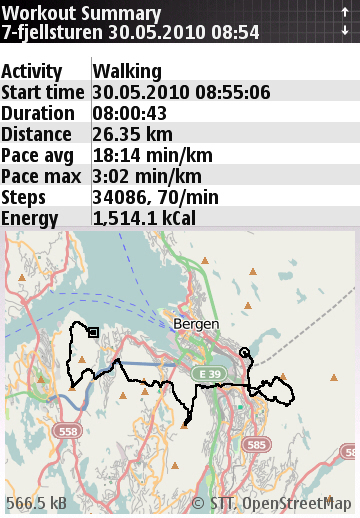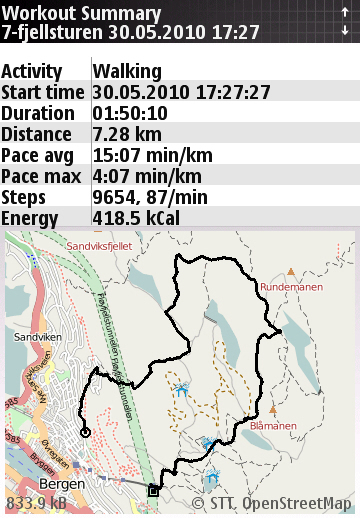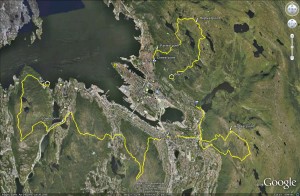For the third time, I took the so-called “7-fjellsturen”, the hike of the seven mountains of Bergen in one day. I am proud to say that I made in 10 hours and 40 minutes, 2 hours and 28 minutes less than my previous result.
| Checkpoint | 2008 | 2009 | 2010 | |||
|---|---|---|---|---|---|---|
| Start 7-fjell (Gravdal ved Nutec) | 8:47 | 00:00 | 8:28 | 00:00 | 8:55 | 00:00 |
| Lyderhorn | 10:14 | 01:27 | 10:06 | 01:38 | 9:45 | 00:50 |
| Damsgårdsfjell | 11:51 | 03:04 | 11:52 | 03:24 | 11:10 | 02:15 |
| Løvstakken | 13:40 | 04:53 | 13:37 | 05:09 | 12:41 | 03:46 |
| Start 4-fjell (Årstad) | 15:00 | 06:13 | 14:36 | 06:08 | 13:37 | 04:42 |
| Ulriken | 16:43 | 07:56 | 16:39 | 08:11 | 15:23 | 06:28 |
| Fløyen | 19:05 | 10:18 | 19:21 | 10:53 | 17:21 | 08:26 |
| Rundemanen | 20:27 | 11:40 | 20:07 | 11:39 | 18:24 | 09:29 |
| Sandviksfjellet | 20:56 | 12:09 | 20:48 | 12:20 | 18:51 | 09:56 |
| Mål (Marken) | 22:27 | 13:40 | 21:36 | 13:08 | 19:35 | 10:40 |
The hike was too long even for Sports Tracker, which crashed after 8 hours. This means that I only have incomplete and maybe corrupted data of my hike. 🙁 The developers of this app will for sure hear from me… 🙂
Special thanks to Synnøve, who shared with me all the editions. Without her, I would have never managed this result. 😉
Update 6 June
It looks like the Sports Tracker data of my hike is not corrupted. It is only incomplete since I started the tracking again half-hour after Sports Tracker crashed. 🙂
Screenshots:


